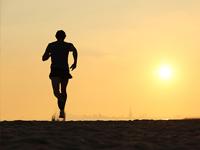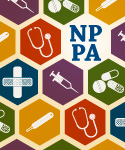April 20th, 2016
Wave
Harrison Reed, PA-C
On the road ahead, a silhouette appears between the blinding rays of sunlight, bouncing to a familiar pulse. As the figure approaches, you can only think of the air passing in and out of your lungs, the ache of your feet, and the heat that sizzles the back of your neck. But just before that other runner passes, you do something that an exhausted person in any other circumstance would find ridiculous.
It might seem strange to onlookers. Nobody waves to strangers anymore. But for two passing souls on a lonely stretch of road, that little greeting is an unwritten tradition in running.
I sometimes wonder why it seems so natural. The impulse to give that bit of humanity to a traveler passing the opposite way doesn’t require thought or planning. It just happens.
Like all instincts and reflexes, it must come down to survival. After all, out on a desolate road, as the miles tick by, there is no help if something goes wrong. If your ankle turns the wrong way, some hidden debris pierces your foot, or an internal organ decides to fail, your very survival could depend on a passing stranger. So maybe you wave knowing that you might be that person’s sole lifeline.
And he might be yours.
But that rule of the open road is often absent in medicine. It’s easy to forget that the bustle of a crowded ER or a busy ICU can be just as isolating as the most remote trail. And sometimes that other runner’s broken ankle or dehydration isn’t obvious. In healthcare, we push those wounds deep beneath the surface.
Every runner knows you have to run your own miles. And in medicine, you can’t shoulder someone else’s burden. But you can look ahead, far down the road, and spot a silhouette bounding along in your direction. You can make sure they are still putting one foot in front of the other.
And you can wave.

; [/php]/images/AU000_hreed.jpg)


Nice connection. As a runner and cyclist I wave or nod to others trudging along when I am out there, but I think the difference in doing it at work is timing. The person passing by while exercising is not going to stop me and tell me about their struggle. When I check in with someone at work I do it genuinely and want to have time to listen to their response, but I often don’t have the time at work. The same thing happens with my patients. What and how I ask them things sometimes depends on the timing of their visit. This is unfortunate in a world that thinks it is so connected, but often lacks genuine connections. I see and feel the suffering related to this every day.
We in Africa have a different way of approaching health care.most patients don’t know they have the right to know exactly what’s wrong with them, why they are being put on a particular medication and so on.hardly do physicians or PAs have time to explain the details of a medical condition to their patients.
I don’t blame we clinicians in our part of the world because of the ratio of clinicians to patients.